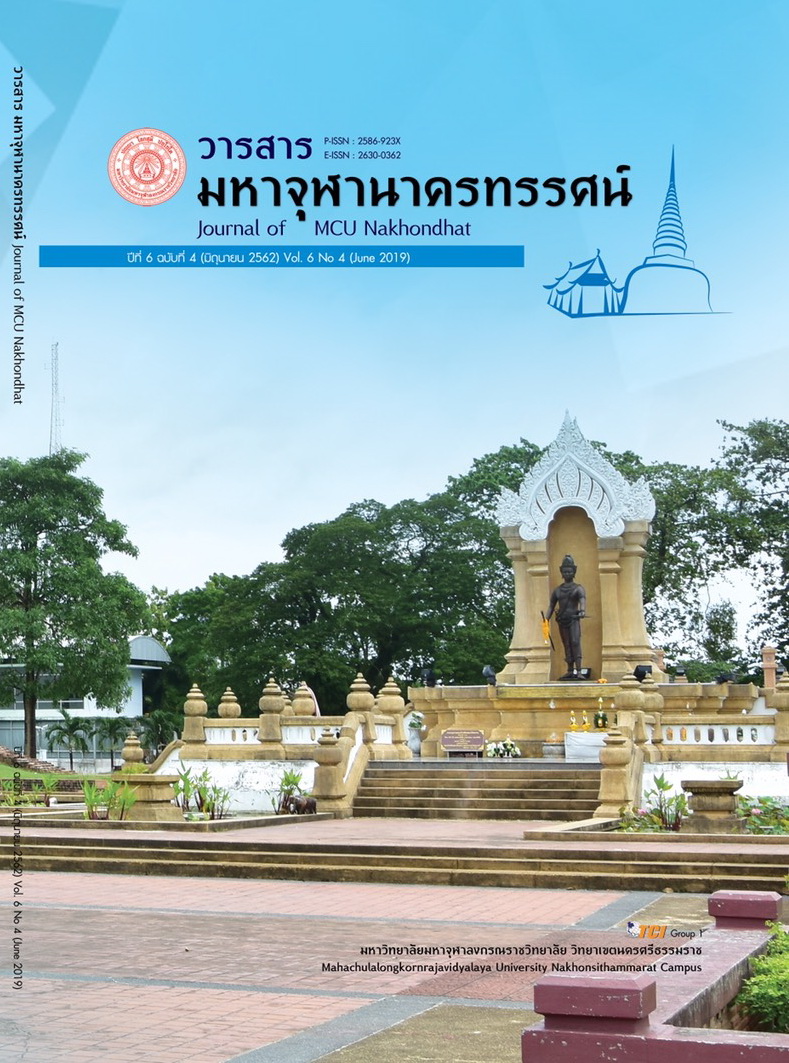A MODEL OF BUDDHIST EMPOWERMENT FOR SCHOOL ADMINISTRATORS UNDER THE OFFICE OF SECONDARY EDUCATIONAL SERVICE AREA 8
Main Article Content
Abstract
The purpose of this research is 1) to study the empowerment condition according to the Buddhist principles For school administrators 2) to develop a model of empowerment according to Buddhist principles For school administrators 3) to present a model of empowerment according to Buddhist principles For school administrators Under the Office of Secondary Educational Service Area 9 Qualitative and quantitative research Qualitative research 17 key informants selected from specific experts Data collection tools are structured in-depth interviews. With individual interviews And the preparation of specific group discussions of 16 images / person Inductive data analysis Quantitative research The sample group is secondary school personnel. Under the Office of Secondary Educational Service Area, District 8, number 400, figure / person. The instrument used is a questionnaire. Data were analyzed by frequency, percentage, mean and standard deviation.
The results of the research found that:
1.conditions and problems and obstacles found that the opinions about the empowerment model according to Buddhist principles For school administrators Under the Office of Secondary Education Area 8 4.35 and when considering each item Sort by average, descending, found that the evaluation of the project in personnel development 4.45, followed by the consideration of vision, mission and the main goal of the school 4.44 and the average mean is the development of personnel for Quality 4.23
2. Concepts, theories and principles of Buddhism That is in line with the empowerment of Buddhism For school administrators under the Office of Secondary Educational Service Area 9, namely the Hierarchy of Needs and 4 Objects By bringing the teachings of the Lord Buddha as the main idea Increasing knowledge and expertise in operations with growth in behavior, mind and intelligence. Adjusted according to the situation of the school which leads to survival and from the main questionnaire of Sangkhavat 4, it was found that the overall picture was at a high level in all aspects.
3.The form of empowerment according to Buddhist principles for school administrators under the Office of Secondary Educational Service Area 9, it was found that the integration process with Sangkhavat 4 resulted in knowledgeable personnel. Correct understanding, correct methods, usefulness and fairness, integrated training process with Sangkhavat 4 The result is that the executives will be adjusted behavior. Increase confidence with more thorough resolution And the development process of integration with Sangkhavat 4, administrators will develop behavior, develop minds, develop ideas or intellect at a higher level. When school administrators Under the Office of Secondary Educational Service Area, District 8 through the form of integration under the Sangkhawattana 4, then the executives will be comprised of T as a talented person, G is a good person, H is happy At a higher level Achieve according to the principles of integrating Buddhism in order to strengthen the power according to the principles of Buddhism For school administrators under the Office of Secondary Educational Service Area 9 in all respects
Article Details
References
นันท์นัทธฉัตร ศรีวิเศษ. (2558). การประยุกต์ใช้หลักพุทธธรรมในการปฏิบัติงานของผู้บริหารและครูในสถานศึกษาขั้นพื้นฐาน สังกัดสำนักงานเขตพื้นที่การศึกษาประถมศึกษากาญจนบุรี เขต 2. ใน วิทยานิพนธ์มหาบัณฑิต คณะครุศาสตร์ สาขาวิชาการบริหารการศึกษา. มหาวิทยาลัยศิลปากร.
มณีรัตนา โนนหัวรอ. (2557). การพัฒนารูปแบบการประเมินเสริมสร้างพลังอำนาจเพื่อเพิ่มสมรรถนะด้านการวัดและประเมินผลการศึกษาของครูประจำการ สังกัดสำนักงานเขตพื้นที่การศึกษาประถมศึกษาปราจีนบุรี เขต 2. ใน ดุษฎีบัณฑิต คณะครุศาสตร์ สาขาวิชาการทดสอบและการวัดผลการศึกษา . มหาวิทยาลัยศรีนครินทรวิโรฒ.
มนตรี จุฒาวัฒนฑล. (2543). นโยบายการผลิตและการพัฒนครู สำนักงานปฏิรูปวิชาชีพครู. กรุงเทพมหานคร: สำนักงานคณะกรรมการประถมศึกษาแห่งชาติ.
สุกัญญา แช่มช้อย. (2556). การประยุกต์ใช้หลักพุทธธรรมในการปฏิบัติงานของผู้บริหารและครูในสถานศึกษาขั้นพื้นฐาน สังกัดสำนักงานเขตพื้นที่การศึกษาประถมศึกษากาญจนบุรี เขต 2. ใน วิทยานิพนธ์มหาบัณฑิต คณะศึกษาศาสตร์ สาขาวิชาการศึกษาภาควิชาบริหารและพัฒนาการศึกษา . มหาวิทยาลัยนเรศวร.
อมรวิชช์ นาครทรรพ. (2545). การบริหารจัดการสถานศึกษาโดยใช้โรงเรียนเป็นฐาน. กรุงเทพมหานคร.


